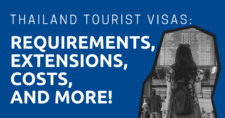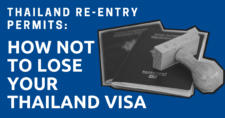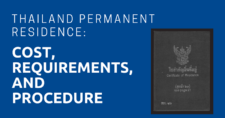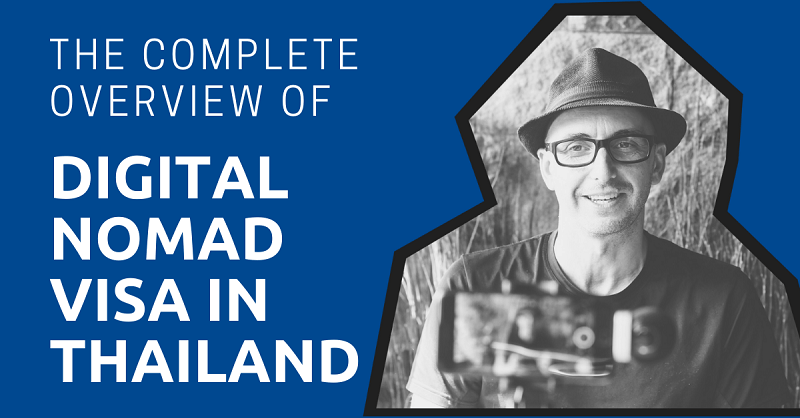
Getting a visa is one of the biggest challenges of being a digital nomad in Thailand.
Fortunately, Thailand recently released a new digital nomad visa known as the Destination Thailand Visa in July 2024. This visa is for digital nomads, remote workers, freelancers, and those who want to come to Thailand to learn Muay Thai and Thai cooking.
In addition, since Thailand has been a popular hub for digital nomads for many years, there are more visa options available to them.
In this article, let’s take a look at popular visa options for digital nomads in Thailand.
"*" indicates required fields
Disclaimer: This article may include links to products or services offered by ExpatDen's partners, which give us commissions when you click on them. Although this may influence how they appear in the text, we only recommend solutions that we would use in your situation. Read more in our Advertising Disclosure.
Contents
(And How It’s Costing Them)
Most expats throw money away, get lost in red tape, and miss the local hacks that make life easier and cheaper. ExpatDen Premium gives you the secrets seasoned expats use to save, earn, and thrive beyond the basics, saving you thousands and opening doors you didn’t even know existed.
Here’s what’s inside:
- Housing Hacks: Slash your rent by 40% or more - because the locals are laughing at what you’re paying.
- Banking Mastery: Stop wasting on fees and get top exchange rates. Why give your money away?
- Healthcare for Local Prices: Quality treatment without the expat price tag.
- Visa and Legal Shortcuts: No more bureaucratic nightmares. Get the visa and residency secrets that others pay their lawyer dearly for.
- Deep Discounts: Find the savings locals rely on for groceries, dining, and more.
If you’re serious about making Thailand work for you, join ExpatDen Premium and make Thailand work for you.
Destination Thailand Visa
The Destination Thailand Visa (DTV Visa) is the most recent visa for digital nomads in Thailand, available since July 15, 2024. This visa is specifically designed for digital nomads and is valid for 5 years. You get 180 days for each entry to Thailand. When your 180 days are up, you can extend it at the local immigration office in Thailand or do a quick border bounce and get another 180 days.
Requirements
The DTV Visa has three main requirements:
- You need to be at least 20 years old.
- You need to have at least 500,000 baht or the equivalent in your bank account.
- You need to have one of the following proofs:
- An employment certificate or a professional portfolio showcasing your digital nomad work.
- A school certificate from a Muay Thai Gym or cooking school.
- A certificate from a hospital (for medical tourism).
You can apply for the Destination Thailand Visa at a Thai Consulate or Embassy. Please note that since the visa was just recently released, the embassy or consulate may have different guidelines on the application process and required documents.
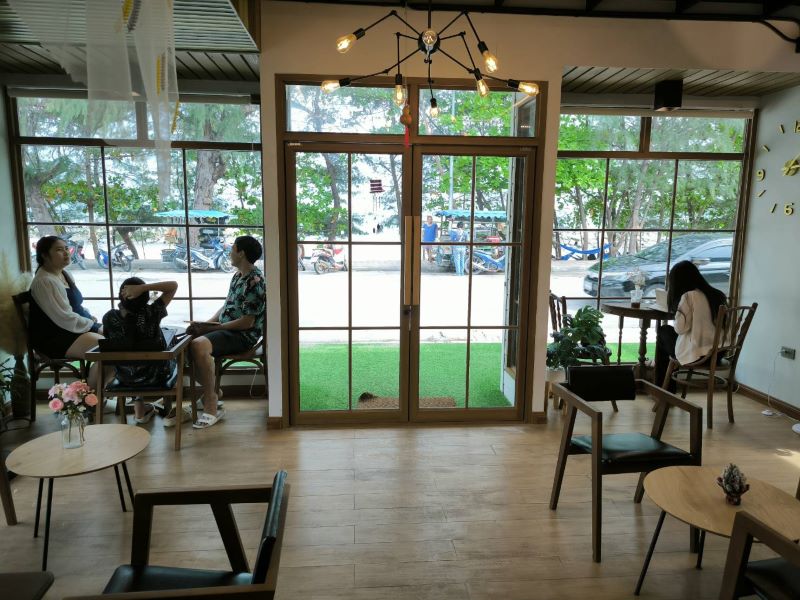
Pros and Cons
Pros
- The requirements are suitable for most digital nomads and remote workers.
- It allows you to stay in Thailand for up to 5 years.
- Your legal dependent can apply for this visa together with you.
- Low application fee of 10,000 baht.
Cons
- Each entry allows you to stay in Thailand for 180 days.
- Unclear application process and required documents.
Our Comments
If you are planning to be a digital nomad in Thailand, this is the first visa you should check by contacting your nearest Thai consulate or embassy for a list of required documents. If you cannot get this visa, then you can check out other options.
Find out more: Destination Thailand Visa (DTV): The Real Digital Nomads Visa
Privilege Visa
The Privilege Visa is the most expensive option for a digital nomad. However, it’s also a convenient option allowing you to stay in Thailand for five to twenty years depending on the package.
One of the best things about the Privilege Visa is that it’s available to anyone as long as you can afford it.
Another requirement is that you need to be free of criminal history. In case you have a minor criminal offence, you might still be able to get the Privilege Visa, depending on how serious it is.
Why the Privilege Visa?
The Privilege Visa has become a popular option for retirees and digital nomads for three main reasons.
- Easy application process: the application process is easy and straightforward. You just need to send your documents online to a program representative and wait for approval. Once you’re approved, you can go to your local Thailand Embassy and have the Privilege Visa stamped in your passport right away. Or you can just fly to Thailand and get the Privilege Visa at the airport.
- Live in Thailand hassle free for upto twenty years: You can live in Thailand hassle free on the visa for five to twenty years depending on your package. The visa requirements rarely change.
- Available to anyone: Everyone can get it as long as they don’t have a criminal history and can afford the program.
However, the Privilege Visa isn’t for everyone.
The package cost can be expensive at 900,000 baht for the 5-year program. The most valuable package, the Diamond Package, allows you to stay in Thailand for 15 years at a cost of 2,500,000 baht.
You need to pay the whole cost of the package upfront.
Since the Privilege Visa is considered a tourist visa, you are not able to get a work permit in Thailand. This means you are unable to legally work for a company in Thailand.
However, it’s still possible to run your international business with the visa while living in Thailand.
Another disadvantage is that you cannot apply for permanent residence or Thai citizenship with it.
Pros and Cons
All in all, here’s a quick summary of pros and cons of the Privilege Visa.
Pros
- It allows you to stay in Thailand for five to twenty years
- It is easy to get this visa
- You have personal support from the Privilege Visa program representative
- Unlike other types of Thailand visas, the Privilege Visa requirement is rarely subject to change
Cons
- It can be costly
- You cannot legally work for a company in Thailand
- You cannot apply for permanent residence or citizenship with it
Our Comment
The Privilege Visa is an interesting option for those who can afford it. It allows you to live in Thailand hassle free for upto 20 years without having to leave the country.
You can read our in-depth Privilege Visa review to find out more information.
Business Visa
A Business visa is ofen called a work visa or a Non-B visa. The full name of this visa is Non-Immigrant B visa.
With this visa, you can stay in Thailand long-term, work in Thailand legally, and get permanent residence after being here for 3-5 years.
Options
A Non-B visa allows anyone to legally work or run a business in Thailand. However, the main requirement of this Non-B visa is to be employed by a company in Thailand, which can be a challenge for digital nomads since they don’t want to work for a Thai company.
Instead, they want to run their own business while living in Thailand.
With this, there are four main options for digital nomads in Thailand who want to work with a Non-B visa.
- Open their own company in Thailand under the Board of Investment promotion. With this option, they can fully own their company without having to find a Thai partner.
- Find a company under the BOI promotion to work with. Since companies with BOI promotion can hire expats much easier than a normal limited company, they usually have open positions for expats. In addition, a majority of companies under the BOI promotion in Thailand, especially in the tech industry, are run by digital nomads.
- Find a company under the BOI promotion to get a visa from. Instead of working for them, they use a visa service from these companies and pay them a certain percentage of their income instead.
- Use a visa agency to find a loophole in the visa system in Thailand and get themselves a Non-B visa.
The first two options are completely legal. The third option is a grey area while the fourth option can be considered illegal. So, you should do it at your own risk.
Pros and Cons
Here’s a quick summary of pros and cons of the Non-B Visa.
Pros
- It allows you to work in Thailand
- When it is legally done, you can apply for permanent residence after holding this visa for 2-3 years.
Cons
- It can be complicated if you want to do it legally
- Not everyone can run a company or wants to work for a company in Thailand
Our Comment
If you already have a business plan and are thinking about opening your own company in Thailand, this option is interesting. Although the initial steps can be complicated, it’s possible to do it on your own.
As a plus, you can get a tax exemption for five to ten years in Thailand as it is another perk of a company promoted by the Thailand Board of Investment.
Education Visa
An Education visa is a popular option for digital nomads that recently moved to Thailand and still haven’t decided whether or not they want to stay here.
It’s easy to get but comes with a short-term duration. If you decide to stay in Thailand long-term, it’s better to get other visas.
Why an Education Visa?
You can easily get an education visa in Thailand by taking the following courses from a school approved by the Ministry of Education in Thailand:
- Language
- Muay Thai
- Thai cooking
Some people also use a visa agent to obtain an education visa that lasts for almost a year. An education visa usually lasts for 3 to 9 months, depending on the duration of the course you take.
Some people might be able to get a one-year education visa by using a visa agent or enrolling in a university in Thailand.
With an education visa, you need to regularly attend your classes. If it’s a language school, the visa agency might test your Thai language during the visa application interview.
Pros and Cons
Here’s a quick summary of pros and cons of the Education Visa.
Pros
- It’s easy to get an education visa
- You can study at the same time as being a digital nomad in Thailand
Cons
- You cannot keep getting new Education visas forever. Most digital nomads we know only use it during their first few years in Thailand
- It can be a hassle to keep finding schools that can give you a visa, especially when you don’t have anything that you are interested in learning
Our Comment
An Education visa is a good option if you really want to learn something in Thailand, including the Thai language at a language school.
You can use it as a temporary solution if you are still not sure which visa to get.
However, you should not keep relying on it. Always remember that working in Thailand with an education visa is still considered illegal.
To find out more information, read our education visa article.
Tourist Visa
A Tourist visa is another popular option for digital nomads who want to see whether Thailand is right for them or not.

But it only allows you to stay in Thailand temporarily. In addition, it’s illegal to work in Thailand with a tourist visa.
Long-Term Resident Visa
The long-term resident visa (LTR visa) is basically an upgraded version of the Non-B visa. It’s issued by the Thailand Board of Investment (BOI) and allows you to stay in Thailand for 10 years straight
Previously, the LTR visa was expected to be a visa for digital nomads. However, it is not.
There are four ways to apply for the LTR visa. The closest one is to work for a public company outside of Thailand or a private company with at least US$150 million in revenue during the past three years.
Other Visa
Thailand has a lot of long-term visa options. But they also come with specific requirements.
Two other popular visa options for digital nomads are the Marriage visa and Volunteer visa.
For those who have a Thai partner, they can get a marriage visa and stay in Thailand long-term. They can also apply for a work permit to legally work in Thailand.
How About the Freelancer Visa?
You might have heard about the Freelancer visa in Thailand before. Some people might even say that they were able to get a Non-B visa in Thailand as a freelancer.
Based on what we know so far, we have not seen any official publications on the Freelancer visa.
Can Digital Nomads Work in Thailand without a Work Permit?
This is one of the most frequent questions asked by digital nomads in Thailand. And it’s also one of the most challenging questions to answer.
Simply put, if you have a work permit then you can legally work in Thailand. This could also mean getting a freelancing gig from a company in Thailand, as long as it isn’t a restricted job such as a barber, tour guide, etc.
If you don’t have a work permit, then it’s another story. Legally speaking, you cannot work in Thailand.
In practice, if your work does not compete with businesses in Thailand or the Thai labor market, you are unlikely to have any problems with immigration officers. An important point is that you need to receive a payment outside of Thailand.
If you are not sure about your situation, it’s a good idea to get legal advice from a lawyer.
What Are My Options Then?
Your options depend on your expectations and qualifications.
For example, if you have at least 500,000 baht or the equivalent in your account, have a professional portfolio, and do not mind extending your visa every 180 days, the Destination Thailand Visa is going to be your best bet.
If you are thinking about opening a company in Thailand, then you should try to get a Non-B visa under the BOI promotion.
If you don’t have any plans to run a company or get a job here, you might want to consider the Priviledge Visa.
If you want to only live in Thailand temporarily, then you can consider an Education visa or a Tourist visa.
There are, of course, loopholes in the visa system in Thailand. You might hear about some people using a visa service to get a certain visa although they might not qualify for it.
Now, on to You
We hope that this article answers everything you need about visa options for digital nomad in Thailand. If you have any other solutions, please feel free to let us know in the comment below.



